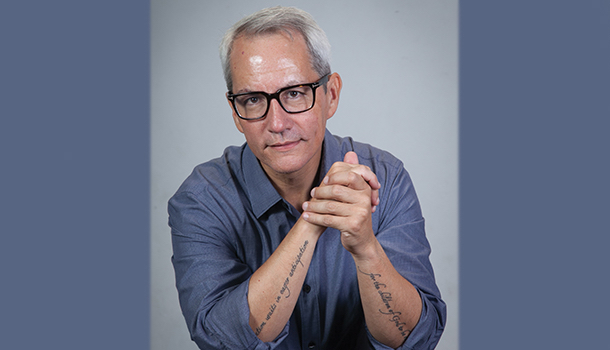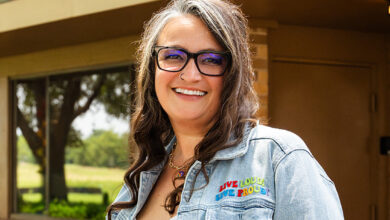
Rev. Michael Gott says being raised in a fundamentalist Christian church impacted him in two important ways. One was the positive foundation of love he experienced, and the other was his need to experience healing after being excluded because of his sexual orientation.
The 51-year-old Gott, who is originally from rural Oklahoma, adds that what he’s learned as a gay man, which he might not have learned otherwise, is compassion.
“When we talk about inferred privilege, I have every privilege offered in Western society except that one,” Gott says. “I am an able-bodied, white, Christian male. This has been the one thing that has excluded me from all of those conferred privileges and rights, and it opened my eyes to all the other people who are excluded in so many ways. So because I’m gay, I have a huge heart for minorities, for the underdog, and for the underprivileged and underserved.
“When we get locked into a single perspective on the world, we’re in trouble,” Gott continues. “That’s why minority voices are so important—particularly LGBTQ voices in spiritual communities. We’ve been a burr under the saddle of a lot of churches, synagogues, temples, and mosques, but now it feels like (at least in the West) we’re reaching this place where voices are being heard, the right questions are being asked, and the right arguments are being made.”
In September 2017, Gott became senior minister at Unity of Houston, one of the largest New Thought communities in the U.S.
“We’re inclusive,” Gott says. “We do not teach that our path is the only path to the divine. Philosophically, we’re much more aligned with some of the Eastern religions—Hinduism and Buddhism particularly—in that we recognize the oneness of all life, the interconnectedness of all life.”
Unity of Houston traces its origins to 1919, when Bertha Miller began hosting study groups in her home on Rutland Street in the Heights. Unity moved to its current campus, west of the Galleria, in 1960 when the area was on the outskirts of town.
“I’m happy to say there are now quite a few LGBTQ-affirming churches in Houston, and that’s a fabulous thing,” Gott says. “What sets us apart is that we’re not a gay church. We have a large LGBTQ membership, and we have a large African-American membership, and we have a large Hispanic membership. That’s my favorite thing about our community: our diversity.”
Gott says his intention, as Unity of Houston evolves, is to “remain rooted in that philosophy of inclusion and celebration of all life and all people,” while at the same time focusing on “engagement, including one-on-one and small-group connections.”
Unity of Houston hosts numerous events, groups, and guest speakers. The groups that meet on any given day have names such as The Artist’s Way, Living Room Conversations, A Course in Miracles, Peacemakers, Animal Kinship, and Latinas Unidas. “My vision is that people find community here, they find teaching here, they find teachers here, and they find a place to share their gifts,” Gott says.
Gott also emphasizes that his goal is to “teach practical tools in-depth.”
“I want people to feel like they’re not just coming for spiritual entertainment, but they’re actually receiving spiritual principles that they can apply in their lives for personal transformation, for greater success, health, wellness, wholeness, and well-being in every area of their lives,” he says.
Gott, a singer, songwriter, and pianist, moved to Houston in 2010 to lead a choir workshop. After joining Unity of Houston as assistant minister and choir director, he became senior minister 10 days before Hurricane Harvey hit. “It was a trial by water,” Gott recalls.
Sister churches in Texas were affected, along with 100 homes of Unity members. “We had an incredible, automatic mobilization—not only a desire to help, but actually helping,” Gott says. “It was really humbling and beautiful to see. I’m grateful for this community and the way it responded.”
Unity of Houston became a clearinghouse for financial gifts from New Thought churches all over North America. The congregation raised $400,000, which it distributed in direct grants to individuals and other churches.
“Early on, when it was still raining and we were stuck in our houses feeling so hopeless and helpless, my partner, John Moore, suggested that one thing I could do because of my musical abilities and connections was to hold a benefit concert,” Gott recalls. “We raised $100,000 that night. The event was live-streamed, and we had over 12,000 views.”
Prior to moving to Houston, Gott says he knew very little about the city. “I came here without any preconceived notions, and I have fallen completely in love with this city,” Gott says. “There is something so real, so authentic. There’s a depth of culture and community here. There’s a commitment to the arts and the culture. The diversity is just huge and powerful and beautiful in this city. I think there’s kind of a ‘get ’er done’ mentally that just feels very friendly and accessible. I love that sense of hard work and collaboration and cooperation, and I think we really witnessed that after Hurricane Harvey.”
Before Gott became a minister, he was primarily known for his music. “Each song has its own way of being revealed,” Gott says about his creative process, “but it starts with a very strong emotional center.”
One of his most impactful songs is titled “There Is Only Love,” which he wrote when he was relatively new to the New Thought movement.
“As I was learning what this teaching meant, my first minister told me that what we really teach is that everything really is the love of God being expressed,” Gott says. “I know that song has been sung as babies were being born, it’s been sung as people were dying, it’s been sung at weddings. It’s been translated into several languages. I’m really grateful for that one.”
Gott believes music is important because primative humans used repetitive vocalizations—precursors to songs—before they even had words. “So music activates really old, deep, deep parts of our brain. It’s tied with emotion. What music does, I think, is activate the truest part of ourselves, and it helps us know ourselves.”
Looking ahead, Gott says, “I’m incredibly humbled and enthralled and excited about the future of this community and this ministry. I keep saying that something is happening here. It’s an intuitive, emotional sense of the potential in this community to do good in people’s lives, and it’s so real to me. I’m grateful and excited to be the leader of this community at this time.”
For more, visit MichaelGott.com or UnityHouston.org.
This article appears in the November 2018 edition of OutSmart magazine.










